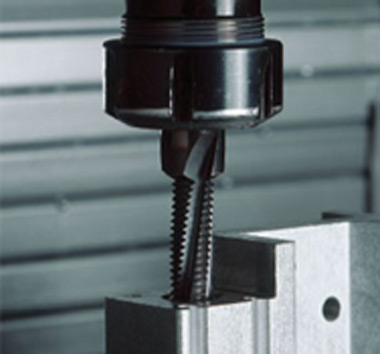Internal and external threads can be made using all available machining methods as well as through plastic deformation. Heat treatable alloys give especially high quality results. Taps for steel can be used for threads under 6 mm but special taps should be used for larger diameters.
Internal threads can either be made with taps in series or with a single tap. The groove for chips should be large and wide, well rounded and polished as well as have a large cutting edge angle. The back surface should run radially or be undercut so that the chips do not fasten between the tool and the thread when the tap is drawn out.
Special threading taps are normally divided into three types. The first is hole polished with the pitch against the cutting line so that the chips are pushed forward in front of the tap during threading. Another type is designed so that the thread is interrupted from groove to groove.
Finally there is one that has a spiral chips groove for lighter cutting with better pressure during threading. External threads are made using ordinary threading tools or screw cutting dies. The threads can also be formed plastically by rolling without any chips being formed. This creates a very strong thread. The external diameter of the part to be threaded should be 0.2 to 0.3 times the size of the screw pitch compared to the nominal thread diameter. It is very important that the centre lines of the metal part and the tool are aligned.
